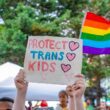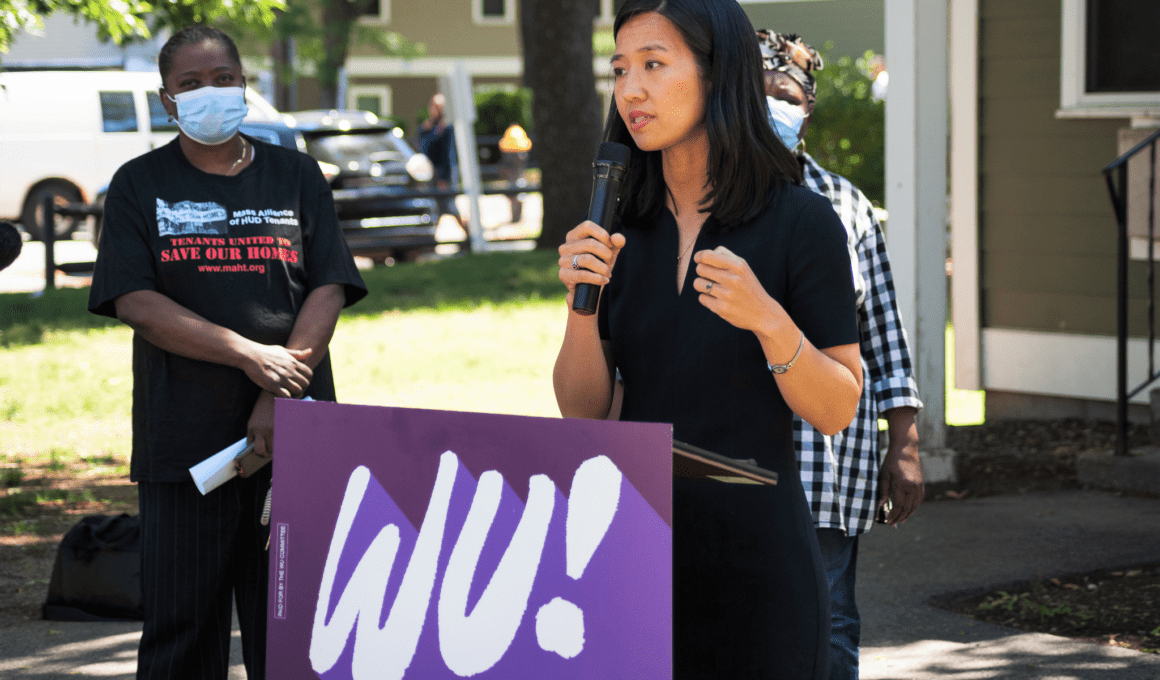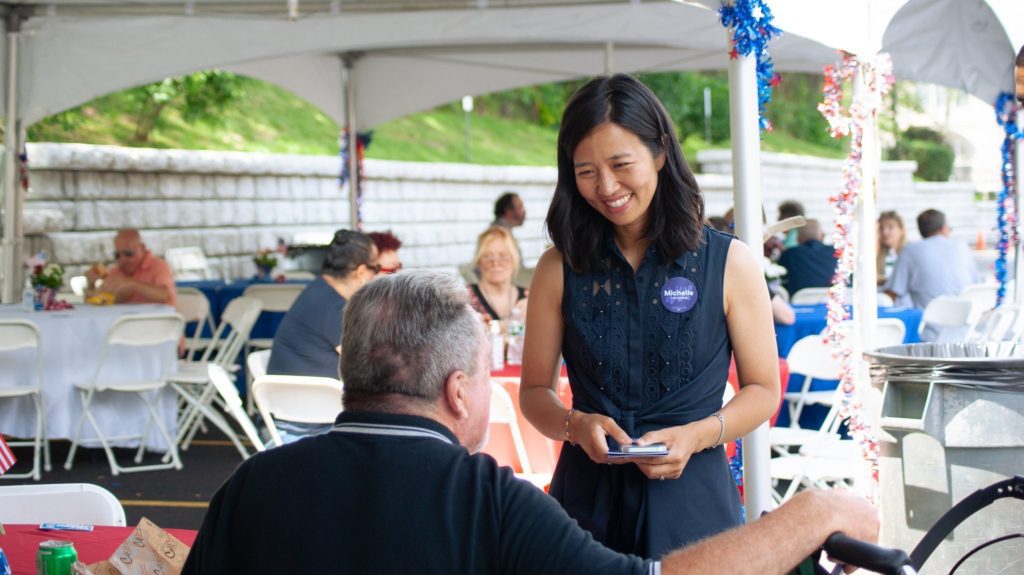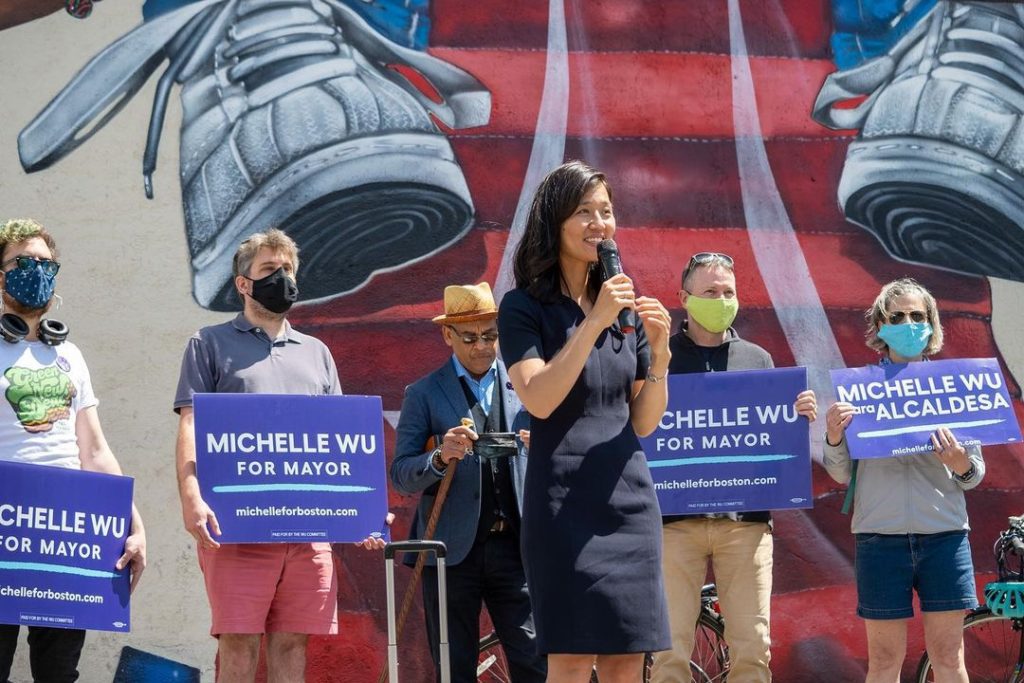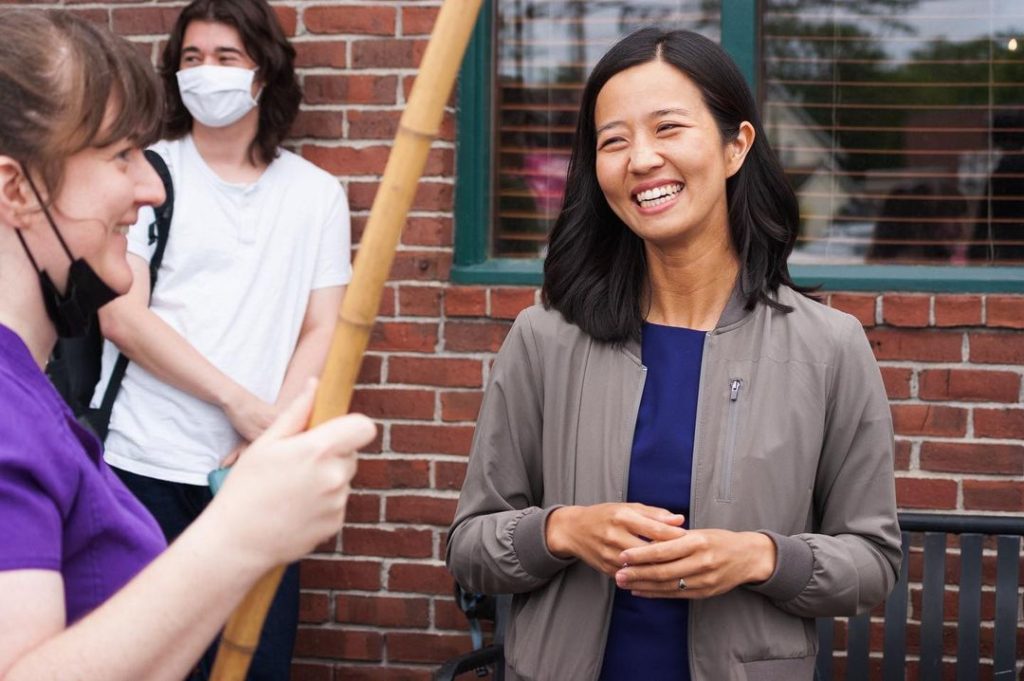Welcome to the fifth installment of The Yappie’s series featuring Asian American and Pacific Islander (AAPI) newsmakers, rising candidates, and lawmakers. If you’re interested in being featured, please email [email protected].
When I first moved across the country to attend college in Massachusetts, there was a certain quality in the air I couldn’t pinpoint. I could feel it everywhere in Boston, in the street names, the statues and memorials, the things people talked about, the stress on names and lineage and schooling.
It was only after I read Danzy Senna’s memoir “Where Did You Sleep Last Night?” that I put a word to it: aristocratic.
Boston is known for its gatekeeping. Just last year, Boston Magazine reported that Boston ranks 15th for segregation among the U.S.’s 51 greater metropolitan areas with large Black populations. No woman or person of color has ever been elected to the office, and city leadership tends to mostly favor whiteness.
The city is changing though—and fast. Over the last generation, the Greater Boston region has seen a “major shift,” according to WBUR News, with an uptick in the number of people of color calling Boston home.
Black and Latinx Americans now comprise 25.2% and 19.8%, respectively, of the city’s population. Native Americans and Pacific Islanders account for a little under 1%, and 5.3% of the city identify as two or more races.
Asian Americans, the U.S.’s fastest growing racial group, make up 9.7% of the city—higher than the proportion of Asians at the national level (roughly 6%).
But Boston itself remains highly siloed. People frequently reject non-Boston natives in elections, and regularly challenge their claims to the city. It’s a refrain that’s familiar to Asian Americans like Boston City Councilor Michelle Wu: You’re a foreigner. You don’t belong here. You’re not one of us.
That rhetoric has dominated discourse when considering who can and should lead the city, and it’s usually directed at people of color.
“When I first ran for City Council in 2013, I was told over and over again that I would likely lose, and for reasons beyond my control: I was too young, not born in Boston, Asian American, female,” Wu wrote in an opinion for the Boston Globe last year.
When she was elected, she became the first Asian American woman and the first person of Taiwanese descent to serve on the council. From January 2016 to January 2018, she led the council—its first woman of color president and only the third woman to ever hold the position in its 106-year history. In 2018, she was one of six finalists honored as an EMILY’s List “Rising Star” and later ranked No. 31 in Boston Magazine’s “The 100 Most Influential People in Boston” list.
She is backed by big names, from national players like Sen. Elizabeth Warren (D-Massachusetts) and AAPI Victory Fund to the fiery New York state lawmaker Yuh-Line Niou (D), who sang her praises when I mentioned I had spoken with Wu.
Wu’s supporters argue that she is what Boston needs in this current moment. The racism that drove the 1903 Boston Immigration Raids—immigration officials arrested at least 234 Chinese Americans, the vast majority of whom were in Boston legally—has reared its ugly head yet again.
Among Boston’s nearly 700,000 residents, anti‐Asian hate crimes jumped 60% in the first quarter of 2021 compared to the same period last year. Local Asian Americans have been spat at, had their tires slashed, encountered slurs including the familiar “Go back to your country,” reported assault, struggled with business losses, ran into anti-Asian graffiti, and more.
Admittedly, the odds are against Wu. She was born in Chicago. She’s running against five well known candidates. And she’s attempting to claim a position very rarely afforded Asian Americans and Pacific Islanders (AAPI), who make up just 0.9% of elected leaders in the U.S.
Because she knows all this, she was one of the first to launch her campaign last year. It was important for her to be “deeply embedded” in the community and help strengthen the civic infrastructure to last “way beyond Election Day 2021,” she tells me. Her platform is one of “redefining what’s possible” and running a “joyful community base that lifts up every neighborhood in our city along the way.”
When we meet for the first time on Zoom, it’s late September. She’s seated in what looks like a home office. As we talk, her two young sons burst into the room, chattering with excitement. She lets them play around a bit before calmly explaining that Mommy is on a call and needs them to be quiet. The boys, both under 10 years of age, quickly nod and leave. A fellow Yappie editor remarks on how cute they are.
Wu laughs it off but admits some apprehension about explaining this period of life to them. While reading a picture book, her three year old had asked why the characters weren’t wearing masks outside. “It hits me once in a while,” she says.
She gives off an air of quiet resolve when we speak, putting thought and care into her words. This isn’t an overly idealistic candidate who sweeps past the minutia to appeal to voters with big dreams and rosy language. Beneath her veneer of composure is a history that sharpened her understanding of the world from an early age. The at-first-glance model minority disappears when you glimpse her tenacity, one that rose from the ashes amid an intimate relationship with the systems that make up government.
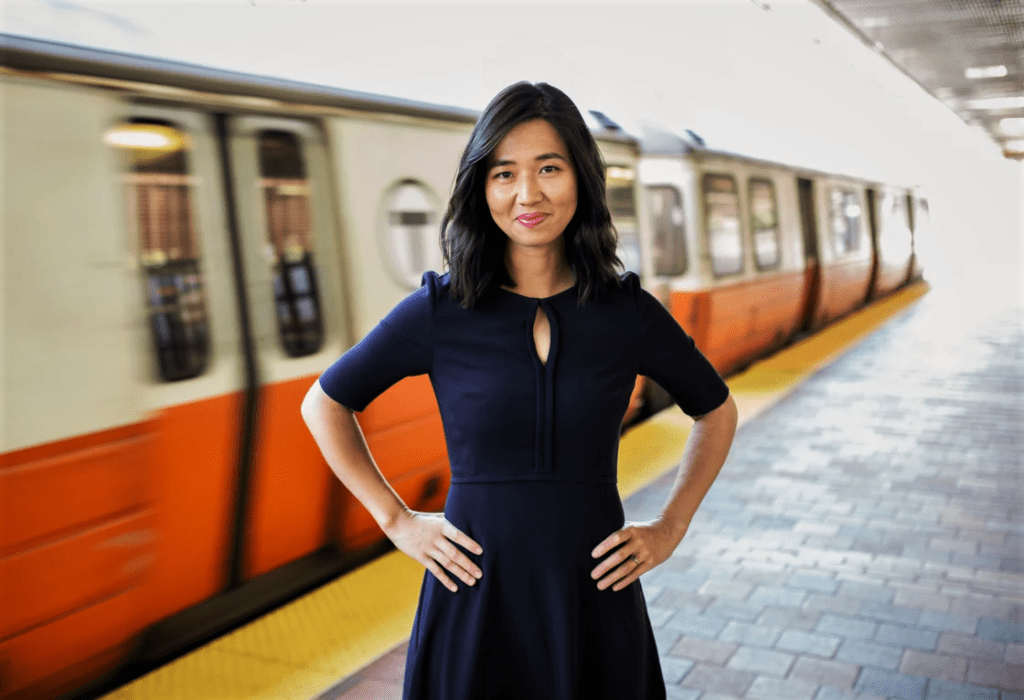

“Asian hyphen American”
Wu was born on the South Side of Chicago in 1985. Her parents immigrated to the U.S. from Taiwan the year prior. Her first language was Mandarin Chinese.
As the oldest of three, she bore the invisible labor of tending to her parents in a country that demeaned them.
“It always felt like two separate identities, the Asian hyphen American,” she said. “It was like there was a wall between them.”
She had the classic lunchbox moment, one millions of Asian Americans know: “I remember very vividly being little and bringing my lunch to school and taking out what was my to-die-for treats from home, whether it was pig ears or dried seaweed, and the reactions of my classmates just hurt, down to my core.”
It forced her to learn early on how to code switch: knowing what foods she could and couldn’t bring to school, altering how she talked about her activities at home, figuring out how to respond when friends came over and made fun of her parents’ accents.
When she was around five years old, her mother signed her up for what’s known as a “manners” class.
“I don't even know how she found it—she wasn’t fluent in English—but I was with all these big kids, and you had to learn how to use the different order of all the forks and cups and bread and some soup,” she said. “It was such a discordant experience compared to just eating at home, which was every night, you know, a bowl of rice, chopsticks, and the various dishes that my parents would make.”
She didn’t have to use that kind of silverware setup until she was in college—a predominantly white, elite setting. But Wu says her mom knew that Wu would have to do more than speak English to succeed in America. She would need to feel comfortable among gatekeeping WASPs who held the key to access and opportunity.
“My mom had a sense that … there are always these barriers up for certain groups of people,” she said. “That’s always been core to how I understand the world and navigate it.”
Her family moved at least four times, mainly in the Midwest where her high school class consisted of over 600 students—but “only a handful” of Asian Americans.
After earning recognition as the U.S. Presidential Scholar from Illinois, she graduated as class valedictorian and moved to the Boston area to attend Harvard, where she regularly made time to serve her elders.
“I would come to Chinatown every single weekend as a student—take the Red Line over the Charles River—and teach classes to seniors in Chinatown who were seeking to become naturalized U.S. citizens,” she told Commonwealth Magazine last year. “That was my home away from home.”
After class, some of the seniors would approach her with letters—like an overdue electric bill, sometimes—and ask who they should call. “It’s all connected when you realize there are so many resources around. The point of our government in such a well-resourced city is to provide that support, and yet the disconnect when people most need that help is huge,” she noted.
Atlas holding the world
Wu was around 23 when her mother began to struggle with a mental health crisis that forced her to raise her two younger sisters and become a long-term caregiver.
I found her outside in the cold rain, standing in the driveway with an umbrella in one hand and a rolling suitcase in the other, waiting to be picked up by an unidentified driver for a secret meeting. “You’re not my daughter anymore, and I’m not your mother,” she insisted, as I begged her to come inside. She pushed back my hair to check for the mole on my right cheek, just in case, because apparently if “The Program” were to create an android of me, they would forget that little detail. It began as paranoia, a feeling that she was being watched and monitored by an entity that seemed similar to the military of her childhood in Taiwan after the war. But as she stopped eating and sleeping, she started calling 911 in the middle of the night to report cries for help that no one else could hear. Most days she believed that school was canceled and rarely left her bedroom, as my sisters, then 10 and 16 years-old, cooked their own meals and woke each other up to catch the bus. — Wu in the Boston Globe
By that point, Wu's parents had divorced. While her peers were exploring newfound independence, focusing on their careers, and expanding their social circles, she was a sister, parent, nurse, household and financial manager, teacher, and full-time worker all in one.
“I've been in the emergency room,” she tells me. “You know, at those emergency room hospital visits with her, and the conversations with mental health providers. The same with schools, to try to explain the situation that was happening—why my mom wouldn’t come to the parent-teacher meeting for my sisters and all the trauma that was going on at home.”
Historically, Asian Americans face a myriad of barriers to mental health care, including problems with insurance, language difficulties, and lack of cultural competency. AAPIs are the racial group least likely to seek mental health services—three times less likely than white counterparts. 73.1% of AAPI adults with a mental illness did not receive treatment in 2018, compared to 56.7% of the overall population.
That was certainly part of Wu’s experience. She didn’t have the luxury of accessing services without coming up against red tape again and again. “I’ve seen that when you most need help, structures and systems often aren’t designed to serve people who speak a different language, or are struggling with a particular issue, and the feeling of just seeing how much she has been dehumanized, you know,” she says, her voice stoic, “in those very hospital rooms and by the probably well-intentioned providers who saw her—AAPI immigrant, accent, broken English—and made all sorts of assumptions.”
The first time my mom was hospitalized, she was forcibly sedated before I was admitted to see her. When I arrived, someone handed me a plastic bag containing her belongings: the ruined clothes that had been cut off her body with scissors. Mom told me in Mandarin that she hadn’t wanted to undress in front of a male attendant; that bag also contained the last bits of her dignity shredded up inside. But unfortunately that wouldn’t be the last time I would stay overnight with her in an ER room, waiting for a mental health bed to open up, and it wasn’t the last time I shook with anger at a system that dehumanized her. — Wu in the Boston Globe
It’s what eventually emboldened her to pursue public service. Those painful experiences showed her it’s not just about making sure the laws on the books “say the right things” or that the right programs exist; it’s also about connecting with people when they need help and breaking down walls around language and culture.
Trying on politics
After raising her sisters, tending to her mother, running a small family business, and “fighting city government constantly on all those fronts,” Wu began considering a career in politics.
“I had the experience of seeing … all the many ways in which government was really the barrier rather than the force of support that it is supposed to be,” she said.
Maybe one day she would work in government and make bureaucratic procedures more efficient for other people; maybe she would serve as a chief of staff to a department head; maybe she would oversee projects involving restaurant permits.
She never thought she’d be the face of the city.
Then, on her first day at Harvard Law School, she walked into class. Her contract law professor was strict—and brilliant, Wu said. At the time, she was known as Professor Elizabeth Warren.
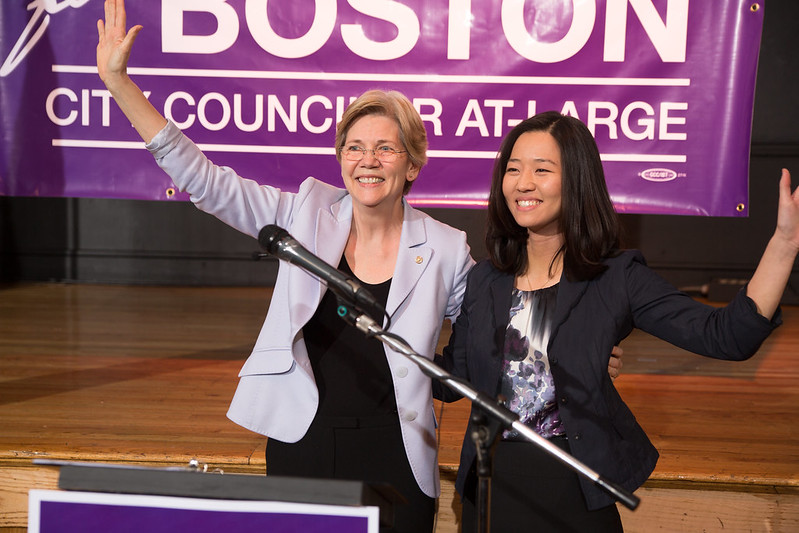

“I’ve been proud to fight alongside Michelle over the last 7 years. She gets out and does the work that needs to be done to make a difference in people’s lives.”
— Sen. Elizabeth Warren's endorsement
That was all it took. By her third year in law school, she was volunteering on Warren’s campaign for Senate. After graduating, she joined the campaign full time.
“I saw how much the politics really matters, too,” Wu said. “You can have great ideas, and you can have all the right policy goals. But unless you're expanding who is included in the political process, you won’t connect the two.”
The power (burden) of representation
Despite having one of the oldest Chinatowns in the country, Boston had only elected one Asian American to the City Council before Wu. (Sam Yoon left the city after losing the 2009 mayoral race, citing the Boston establishment as an immovable roadblock.)
She is aware of what it means to run for mayor as a Taiwanese American woman. She will always be perceived as speaking for all Asian Americans in a way Marty Walsh never had to do for white people. It’s a burden she shouldn’t have to shoulder, but she tells me it’s given her the opportunity to bring the community to the table.
“There has been a lot of weight … to know that I want to be representing the diversity of the AAPI community—to know that when people see me in that seat that I am there to bring our community to the table but also to make sure that people know our community is not a monolith and that there are many, many perspectives along the spectrum,” she says.
In 2013, she was in Boston Chinatown during the Lunar New Year season when she realized that her campaign for City Council—her first—was larger than just her. At a family association banquet (family associations are support networks made up of families with the same last name who first came together in the early waves of immigration), a community leader pulled her aside.
“We’re so excited you’re running for City Council. You’re gonna win,” she recalls him telling her with a huge smile.
“Oh, thank you so much. I’m so grateful to have your support,” she responded.
“The smile disappeared from his face,” she says. “He got really serious and said, ‘No, you have to win because we need you to bring honor to the association.’”
The room was filled with several hundred people. They all shared her last name. And they were all looking at her. She felt the pressure and the weight in that moment.
Looking the part
With so few AAPIs elected to government, many don’t ever consider pursuing politics. “It’s natural to just assume that you won’t be included in the decision-making, much less be the decision-maker,” Wu notes. That was certainly the case for her, but she also says there’s a specific reason she never thought she would become an elected official.
“My parents were really intentionally trying to shield us from politics,” she says.
Asian American family trees are often marked by politics, whether it’s imperialism, colonialism, war, famine, corruption, genocide, displacement, or something else. “I was raised to think that politics was about making deals, or you know, something shady or borderline deceptive,” Wu explains.
Here, I mention my agreement, and we laugh over the shared experience. It’s not like our parents were wrong—politics was and is “shady.” And yet, if our parents immigrated to the U.S. for democracy and better opportunity, shouldn’t we ensure America keeps its promise by helping right the system?
That’s what she’s trying to do, Wu says.
Wu is, of course, an Asian American woman—traditionally underrepresented in leadership and stereotyped as quiet, submissive, meek. She is also one of the council’s youngest members and a mom with two young kids, a role that automatically comes with gendered social expectations.
The leaders of the world look and act a certain way, she acknowledges—“loud, angry, extroverted or tall or male.” It’s a mold she knew she’d never fit. She doesn’t need to, she says.
“What I know having been on the inside now and fighting to change the system is that politics is public service,” she said. “It’s identifying, listening, and developing a vision with and from the community, and then finding the way to put the resources towards making that happen. And the culture that I was raised in, of respecting those who come before you and putting the needs of the larger community as a priority—those are the very characteristics that make for good effective public policy and effective public servants.”
“Leaning into the dialogue”
There’s no doubt Wu has made a name for herself in the last six years. “If you pay attention to Boston politics, four-term city councilor Michelle Wu is a familiar figure, known for her electoral prowess and her determinedly progressive politics,” GBH News writes.
She is intimately familiar with what it means to be the face of an oft-invisible demographic. “We’re not there when it comes to Asian Americans in office, and it is a whole ecosystem,” she tells me when we touch on political representation. “Even now, on the campaign trail, it comes up constantly: ‘Where do Asian Americans actually fit in the spectrum of communities of color and how do you actually feel about the Black Lives Matter movement?’”
When it comes to Black-and-Asian tensions, Wu sees the value of “leaning into the dialogue” and making space for education. She also emphasizes the importance of recognizing the ways different communities of color do fit together.
“Even before COVID-19 had its official name but people sort of knew there was a coronavirus, you’d walk onto the subway train and everyone would immediately shift away,” she says, describing the early days of the pandemic that kicked off a yearlong spike in anti-Asian hate.
That led “straight into a summer of public demonstrations and national reckoning following the murders of George Floyd, Breonna Taylor, Ahmaud Arbery.” Police continued to kill Black Americans during the pandemic in a “so-called justice system without accountability,” she said.
For her, having the hard conversations is key. White supremacy has pitted Black and Asian Americans against each other for a long, long time. But the two communities are in fact “very much intertwined.”
Wu says she is grateful for the opportunity to speak up against structural racism and oppression—on the campaign she has underscored her support for reparations for Black communities—and recognizes nothing is static. “It always requires deep reflection and continuing to challenge my own perceptions and how we keep moving the city forward together, acknowledging the harms that have been done and the need for repair,” she says.
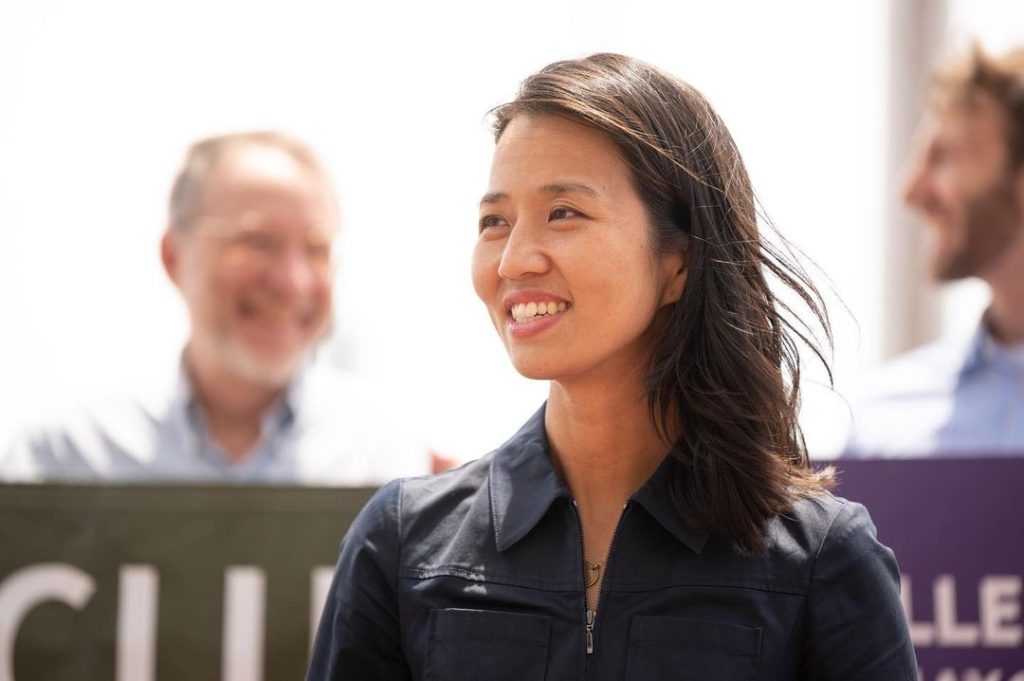

The beauty in the mundane
These days, it often feels like local politics are overlooked in favor of national and state-level issues. But for Wu, the municipality is where it’s at. In local office, politicians can work directly with activists and community members pushing for change. The relationship between residents and city government feels like an authentic partnership, with residents and advocates “digging into elections” to hold candidates accountable, Wu said.
“This is the dream job,” she tells me. “This is the role and the level of government in the city where we can make change today, tomorrow, the week after.”
“I am only in government—only in politics—because I have lived what it means when government works and when it doesn’t,” she adds. “There are lots of issues that we want to solve and lots of policies that need to be put in place. But the most important foundation is people in the community feeling like they have a stake in shaping their own future … I think it’s only possible to happen quickly at the local level because you are that close to people's daily lives.”
It doesn’t mean Boston’s city government is perfect. Far from it, Wu says. That’s what her campaign is trying to do: reimagine what’s possible.
“The need is so great,” she said. “In this moment we’ve seen just how fragile the status quo is, for communities of color in particular and the underserved and historically marginalized.”
She is especially conscious of the Asian American community’s continued anguish. The Atlanta shootings, in which a white man killed six Asian women, weigh heavily three months out. “The ongoing reminders of just how deep hatred, structural racism and killing of unarmed, particularly Black Americans, and now an acceleration of anti-Asian hate to the point where there is clear violence and murder—sometimes it feels like too much to bear,” she said at a mid-April rally against Asian hate.
When I ask how her mom is doing, Wu admits it’s hard to tell sometimes.
“She lives with me and we have a two-family home, but it’s actually really hard on her. As someone who does live with mental health challenges, it's really important for her to have her routines and to be able to go to the grocery store for fresh vegetables whenever she wants,” she says. “To have those big changes has been a lot for the whole family to handle.”
It’s an interesting thought exercise to consider what Wu would be doing if her mother hadn’t developed her mental health struggles. Would Wu have pursued politics? The pains that accompanied the experience impact her approach to governance every day.
As someone whose family struggles with a myriad of mental health issues, I tell Wu it means a lot to hear her speak candidly about her family’s experience. It’s such a taboo thing, both in the U.S. and among Asian Americans in particular. She says it took her a long time to be able to talk about it without breaking down.
12 years have passed since she had to take over as head of the household. But in that first year, “I don’t know if I even told my friends.”
“There’s a very, very small circle of folks that I even felt comfortable telling about the extreme despair and helplessness that we were feeling, largely because of stigma and shame,” she says plainly. “My mom still doesn’t like to talk about the issue … She doesn’t want to be labeled, you know, quote-unquote ‘crazy.’”
But every time someone approaches her to convey their own mental health challenges, she remembers why she shares her story. She remembers why she’s running.
When I ask her to describe her campaign in five words—and tack on “or fewer!”—she looks into the camera as if she’s in “The Office” and says jokingly, “I mean, I’m Asian, right? I follow the rules.”
Counting her fingers, she comes back with: “Bold urgent leadership building community.”
Wu was obviously poking fun at standard Asian stereotypes, but I can’t help noticing how every step in her career has subverted the rules. The rules say only cis white men can lead the city. That she’s too quiet, too young, too foreign. The rules say Asian and Black Americans are fundamentally opposed and that people can only work within the status quo. The rules say people should hang their families’ mental illnesses in a dark closet. That Asians don’t run for office.
She has disrupted every notion. And she’s ready to disrupt some more.
Sunjay Lee contributed reporting.
The Yappie is your must-read briefing on Asian American + Pacific Islander power, politics, and influence. Make a donation, subscribe, and follow us on Twitter (@theyappie).







